Comprehensive Guide to Garden Maintenance in Sutton
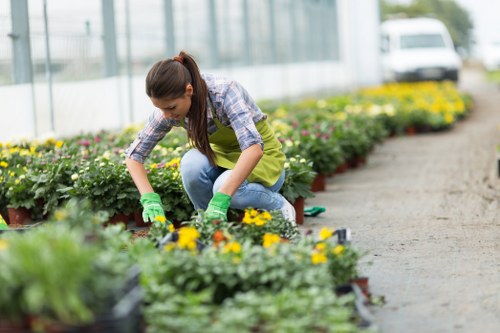
Understanding the Importance of Regular Garden Maintenance
Maintaining a beautiful garden in Sutton requires consistent care and attention. Regular garden maintenance not only enhances the aesthetic appeal of your outdoor space but also promotes the health and longevity of your plants. Whether you're a seasoned gardener or a novice, understanding the fundamental aspects of garden upkeep is essential for achieving a thriving garden.
Proper maintenance involves a variety of tasks, including pruning, weeding, fertilizing, and pest control. Each of these activities plays a crucial role in ensuring that your garden remains vibrant and resilient throughout the seasons. Neglecting any of these aspects can lead to issues such as overgrowth, plant diseases, and decreased biodiversity.
In Sutton, the climate presents unique challenges and opportunities for gardeners. The region's temperate weather allows for a diverse range of plant species to flourish, but it also requires specific strategies to manage seasonal changes effectively.
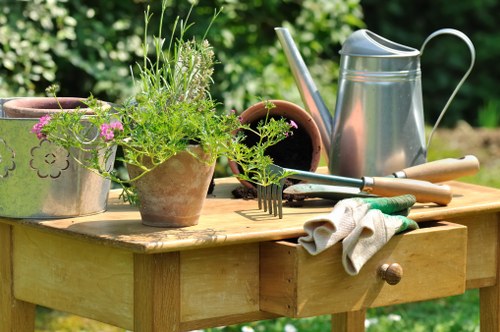
Seasonal Garden Maintenance Tasks
Spring: Preparing for Growth
Spring is a pivotal time for garden maintenance in Sutton. As temperatures rise, it's essential to prepare your garden for the upcoming growth period. Begin by clearing out winter debris, such as fallen leaves and dead plant material, to prevent the spread of diseases and pests.
Pruning is another critical task in the spring. Remove any dead or damaged branches from trees and shrubs to encourage healthy new growth. Additionally, this is an ideal time to plant new flowers and vegetables, taking advantage of the favorable growing conditions.
Fertilizing your garden helps replenish nutrients in the soil, providing plants with the necessary sustenance for vigorous growth. Choose a balanced fertilizer that suits the specific needs of your garden plants to achieve the best results.
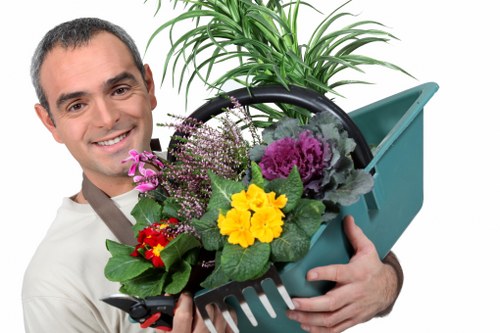
Summer: Managing Heat and Pests
Watering Techniques
During the summer months, maintaining adequate moisture levels in your garden is paramount. Implement efficient watering techniques, such as drip irrigation or soaker hoses, to deliver water directly to the plant roots while minimizing evaporation.
Mulching around plants retains soil moisture, suppresses weed growth, and regulates soil temperature. Organic mulches, like bark or compost, also contribute to soil fertility as they decompose.
Regularly inspect your garden for signs of pests and diseases. Early detection allows for prompt intervention, preventing minor issues from escalating into significant problems. Consider using organic pest control methods to protect beneficial insects and maintain ecological balance.
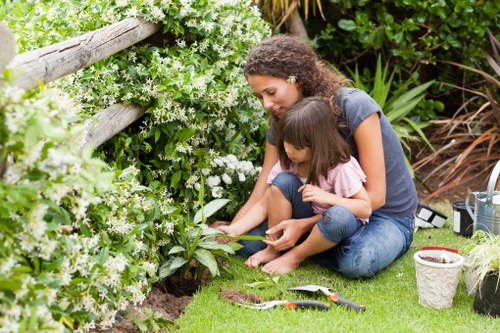
Autumn: Preparing for the Cooler Months
Leaf Management
Autumn is a time for preparing your garden for the winter ahead. Begin by raking and removing fallen leaves, which can harbor pests and diseases. Composting leaves is an eco-friendly way to recycle nutrients back into your garden.
Planting hardy perennials and bulbs now allows them to establish strong root systems before the cold sets in. This ensures robust growth in the spring.
Protect sensitive plants by applying a layer of mulch to insulate the soil against freezing temperatures. Additionally, consider covering delicate plants with frost cloths to provide extra protection during unexpected cold snaps.
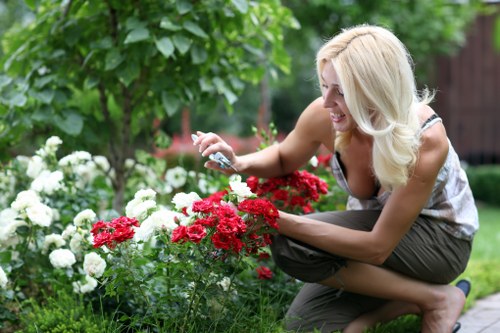
Winter: Protecting and Planning
Garden Protection
Winter in Sutton can be harsh on gardens, making protection strategies essential. Trim back dead or overgrown branches to prevent damage from heavy snow or ice accumulation.
Ensure that garden tools and equipment are cleaned, dried, and stored properly to extend their lifespan. This simple step can save you time and money in the long run.
Use this quieter season to plan your garden for the upcoming year. Research new plant varieties, design layouts, and consider implementing sustainable practices such as rainwater harvesting or composting to enhance your garden's resilience.
Choosing the Right Plants for Sutton
Selecting plants that are well-suited to Sutton's climate is crucial for a successful garden. Opt for native species that are adapted to local conditions, as they typically require less maintenance and are more resistant to pests and diseases.
Consider incorporating a mix of perennials and annuals to ensure year-round color and interest. Perennials provide long-term structure, while annuals can be changed seasonally to add variety.
Additionally, integrating evergreen plants can maintain garden structure during the winter months, providing continuous visual appeal.
Professional Garden Maintenance Services in Sutton
While DIY garden maintenance can be fulfilling, enlisting the help of professional services in Sutton can save time and ensure optimal results. Professionals have the expertise to handle complex tasks such as landscape design, soil testing, and advanced pest management.
Hiring a garden maintenance service allows you to focus on enjoying your outdoor space without the stress of upkeep. Services often include regular lawn care, pruning, planting, and seasonal clean-ups tailored to your garden's specific needs.
Additionally, professionals can offer valuable advice on plant selection, garden layout, and sustainable practices to enhance your garden's productivity and beauty.
Eco-Friendly Gardening Practices
Adopting eco-friendly practices in your garden not only benefits the environment but also promotes a healthier garden ecosystem. Implementing techniques such as composting, rainwater harvesting, and using organic fertilizers can reduce your garden's ecological footprint.
Encouraging biodiversity by planting a variety of species attracts beneficial insects and wildlife, creating a balanced and resilient garden. Avoiding chemical pesticides and opting for natural alternatives helps maintain soil health and protects pollinators.
Furthermore, conserving water through efficient irrigation systems and drought-resistant plants ensures sustainable garden maintenance, especially during periods of water scarcity.
Tools and Equipment for Effective Garden Maintenance
- Pruning Shears: Essential for maintaining the shape and health of your plants.
- Garden Fork: Useful for aerating soil and removing weeds.
- Watering System: Drip irrigation or soaker hoses help deliver water efficiently.
- Mulching Materials: Retain moisture and suppress weed growth.
- Compost Bin: Recycle organic waste into nutrient-rich compost.
Investing in quality tools and equipment can significantly improve the efficiency and effectiveness of your garden maintenance efforts. Regularly maintaining your tools ensures their longevity and performance.
Maintaining a Healthy Lawn in Sutton
Grass Selection and Care
Choosing the right type of grass is fundamental for a healthy lawn in Sutton. Cool-season grasses, such as fescue and ryegrass, thrive in the region's climate, offering durability and vibrant color.
Mowing your lawn regularly promotes healthy growth and prevents weeds from taking hold. Aim to mow at a height of 2.5 to 3 inches, allowing the grass to develop a strong root system.
A scheduled fertilization routine provides essential nutrients, keeping your lawn lush and resilient against pests and diseases.
Pruning and Trimming Techniques
Pruning and trimming are vital for maintaining the structure and health of your plants. Proper pruning encourages air circulation, reduces disease risk, and promotes vigorous growth.
Use sharp, clean tools to make precise cuts, and follow plant-specific guidelines to avoid damaging your foliage. Regular trimming maintains the desired shape and prevents overgrowth that can overshadow other plants.
In addition to aesthetic benefits, strategic pruning can enhance plant productivity, especially for fruit-bearing trees and flowering shrubs.
Weed Control Strategies
Weeds compete with your garden plants for nutrients, water, and sunlight, making effective weed control essential. Implementing both preventative and active strategies can keep your garden weed-free.
Mulching is an excellent preventative measure, as it suppresses weed germination and growth. For active control, hand-pulling or using appropriate weeding tools can remove unwanted plants without harming your garden.
Consider natural weed deterrents, such as vinegar or boiling water, to manage stubborn weeds without relying on chemical herbicides.
Soil Health and Fertility
Healthy soil is the foundation of a thriving garden. Regularly testing your soil's pH and nutrient levels allows you to tailor your fertilization and amendment practices effectively.
Incorporate organic matter, such as compost or well-rotted manure, to improve soil structure, enhance moisture retention, and provide essential nutrients to your plants.
Avoid over-tilling, which can disrupt soil microorganisms and degrade soil quality. Instead, practice sustainable soil management techniques to maintain long-term fertility.
Integrated Pest Management (IPM)
Adopting an Integrated Pest Management approach helps control pests sustainably while minimizing environmental impact. IPM involves monitoring pest populations, identifying pests accurately, and implementing a combination of biological, cultural, and mechanical control methods.
Introduce beneficial insects, such as ladybugs and lacewings, which naturally prey on common garden pests. Additionally, maintaining plant diversity can disrupt pest life cycles and reduce the likelihood of infestations.
Use organic pesticides as a last resort, selecting those that target specific pests without harming beneficial organisms.
Enhancing Garden Aesthetics
Aesthetics play a significant role in garden satisfaction. Incorporate a variety of plant textures, colors, and heights to create a visually appealing landscape.
Use garden ornaments, such as trellises, benches, and decorative stones, to add character and focal points to your garden space. Additionally, proper lighting can highlight key features and extend the usability of your garden into the evening hours.
Consider seasonal color schemes to ensure that your garden remains vibrant throughout the year, adapting to the changing landscape as seasons progress.
Sustainable Gardening Practices
Embracing sustainability in your garden not only benefits the environment but also enhances the resilience of your garden ecosystem. Practices such as rainwater harvesting, composting, and using native plants contribute to a more sustainable garden.
Implementing water-saving techniques, like mulching and efficient irrigation systems, reduces water consumption and ensures that your plants receive adequate moisture.
Promote biodiversity by planting a variety of species, which attracts pollinators and beneficial insects, fostering a balanced and healthy garden environment.
Conclusion: Achieving a Thriving Garden in Sutton
Effective garden maintenance in Sutton requires a blend of knowledge, consistent effort, and strategic planning. By understanding the unique demands of the local climate and employing best practices throughout the seasons, you can cultivate a garden that is both beautiful and sustainable.
Whether you choose to undertake garden maintenance yourself or enlist professional services, prioritizing the health and aesthetics of your garden will yield rewarding results. Embrace the joys of gardening and transform your outdoor space into a flourishing oasis.
Contact us today to learn more about our specialized garden maintenance services in Sutton and take the first step toward your dream garden.